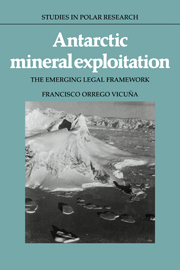Book contents
- Frontmatter
- Contents
- Preface
- Acknowledgement
- Abbreviations
- Part I The international legal framework of Antarctic co-operation and the development of resources
- Part II Alternative approaches to the conservation and development of Antarctic minerals: the process of internal accommodation
- Part III Issues and options relating to the external accommodation
- Appendix 1 The Antarctic Treaty
- Appendix 2 Table of signatures and ratifications
- Table of Cases
- Table of Statutes and national legislation
- Table of Treaties
- Bibliography
- Index
- Frontmatter
- Contents
- Preface
- Acknowledgement
- Abbreviations
- Part I The international legal framework of Antarctic co-operation and the development of resources
- Part II Alternative approaches to the conservation and development of Antarctic minerals: the process of internal accommodation
- Part III Issues and options relating to the external accommodation
- Appendix 1 The Antarctic Treaty
- Appendix 2 Table of signatures and ratifications
- Table of Cases
- Table of Statutes and national legislation
- Table of Treaties
- Bibliography
- Index
Summary
Since the Antarctic Treaty was signed in 1959, co-operation in the Antarctic has been the subject of continuing evolution and rapid change. The negotiation and subsequent enactment of various regimes for the conservation and management of Antarctica's natural resources has been a particularly important cornerstone in this process of adaptation to, and regulation of, new activities in Antarctica. The aggregate of treaties, recommendations and other instruments and procedures which have come to be known as the Antarctic Treaty system, contribute today to an impressive body of emerging law which governs the activity of men in that continent and in the Southern Oceans.
The first part of this book examines the main characteristics of the international legal framework governing the co-operation of States in Antarctica, with particular reference to the problems of conservation of resources in the area, inquiring into the evolution of this process of co-operation at different stages of activity in Antarctica and the new problems and requirements which the system has had to address as a consequence of the changing conditions. The expansion of the system into new fields of co-operation has been a central feature of this evolutionary process, giving place not only to increased law-making by the Treaty parties but also to important institutional developments.
The key question which any Antarctic regime has had to face either directly or indirectly is that of the exercise of jurisdiction and the legal bases on which it could be founded.
- Type
- Chapter
- Information
- Antarctic Mineral ExploitationThe Emerging Legal Framework, pp. viii - xiPublisher: Cambridge University PressPrint publication year: 1988

